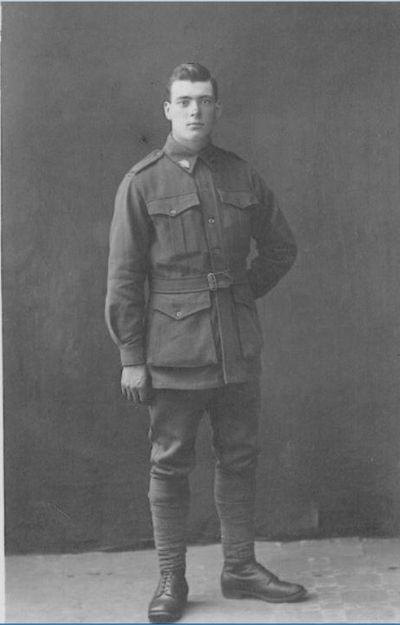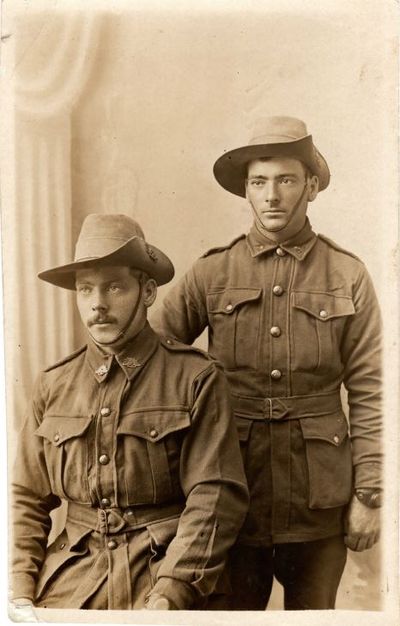Difference between revisions of "Albert John Harris"
From Our Contribution
| Line 74: | Line 74: | ||
They remained there for all of September 1917, moving back into the front line positions late in the month and participated in the battle known as Broodseinde, attacking high ground to the south east of Ypres held by the Germans. Albert was wounded on 5 Oct 1917, after the battalion had secured their objectives, and before they were relieved on the night of 5th/6th Oct 1917. Casualties, including Albert's were caused by enemy shelling. | They remained there for all of September 1917, moving back into the front line positions late in the month and participated in the battle known as Broodseinde, attacking high ground to the south east of Ypres held by the Germans. Albert was wounded on 5 Oct 1917, after the battalion had secured their objectives, and before they were relieved on the night of 5th/6th Oct 1917. Casualties, including Albert's were caused by enemy shelling. | ||
| − | Albert's wounds were to the side of his body. He was treated first by the 11th | + | Albert's wounds were to the side of his body. He was treated first by the [[11th Field Ambulance]], and passed the next day to the [[3rd Australian Casualty Clearing Station]]. On 7 Oct 1917 he was admitted to the 3rd Canadian General Hospital in Boulogne with shrapnel wounds to left shoulder and buttock. On 11 Oct 1917 he was placed on [[HS Jan Breydel]] for England where he was admitted to the Middlesex War Hospital in Clacton-on-Sea with shrapnel wounds now described as being to his left leg and buttock. On 29 Oct 1917 he had recovered enough to be released to the [[3rd Australian Auxiliary Hospital]] in Dartford. |
| − | November and December 1917 were spent gaining strength at Command Depots in Hurdcott and Weymouth before he was reclassified and sent to the Overseas Training Brigade at Longbridge Deverill on 11 Apr 1918. On 8 May 1918 he returned to France via Folkestone and rejoined the 44th Battalion on 10 May 1918. Albert saw out the rest of the hostilities with the 44th Battalion, remaining with them until 13 Mar 1919 when he was transferred to the Australian Corps Workshops as a cook. On 14 May 1919 he returned to England | + | November and December 1917 were spent gaining strength at Command Depots in Hurdcott and Weymouth before he was reclassified and sent to the [[Overseas Training Brigade]] at Longbridge Deverill on 11 Apr 1918. On 8 May 1918 he returned to France via Folkestone and rejoined the 44th Battalion on 10 May 1918. Albert saw out the rest of the hostilities with the 44th Battalion, remaining with them until 13 Mar 1919 when he was transferred to the Australian Corps Workshops as a cook. On 14 May 1919 he returned to England [[Codford]] to prepare for his return to Australia where he was discharged by the 5th Military District on 17 Jan 1920. |
| − | |||
| − | |||
==Post War== | ==Post War== | ||
| Line 97: | Line 95: | ||
[[Category:Farm hand]] | [[Category:Farm hand]] | ||
[[Category:Catholic]] | [[Category:Catholic]] | ||
| − | |||
[[Category:1917 WIA]] | [[Category:1917 WIA]] | ||
[[Category:Returned to Australia]] | [[Category:Returned to Australia]] | ||
[[Category:Gosnells]] | [[Category:Gosnells]] | ||
Latest revision as of 13:28, 14 August 2021
 Courtesy Ann Chivers | |
 Courtesy Ann Chivers - George on left, Albert right | |
| Personal Information | |
|---|---|
| Date of Birth | 1894 |
| Place of Birth | Wagin, Western Australia |
| Death | 15 Nov 1971, aged 77 |
| Place of Death | "Sunset" Men's Home, Nedlands, Western Australia |
| Age at Enlistment | 23 years, 3 months |
| Description |
5'7" (1.70m) tall ; 145lbs 65.771 kg ; fair complexion ; blue eyes ; fair hair |
| Occupation | Farm hand |
| Religion | Roman Catholic |
| Address | Arthur River, near Wagin, Western Australia |
| Next of Kin | Father , Mr George Albert Harris |
| Military Information | |
| Reg Number | 3071 |
| Date of Enlistment | 27 Oct 1916 |
| Rank | Private |
| Unit/Formation | 44th Battalion, 7th Reinforcements |
| Date of Embarkation | 29 Jan 1917 ‒ 27 Mar 1917 |
| Ship Embarked On | HMAT A28 Miltiades Fremantle to Devonport |
| Date of Return | 29 Jul 1919 ‒ 27 Sep 1919 |
| Ship Returned On | SS Main London to Fremantle |
| Fate |
WIA 5 Oct 1917 Broodseinde Return to Australia |
| Monument | Gosnells Primary School Honour Roll |
| Medals |
British War Medal Victory Medal |
Pre War
Had attended the Gosnells Primary School
War Service
Enlisted in Bunbury, and entered Blackboy Hill camp on 27 Oct 1916. Following basic training he was allocated to the 7th reinforcement draft for the 44th Battalion on 24 Jan 1917, and sailed on 29 Jan 1917 for England aboard HMAT A28 Miltiades.
Disembarking in Devonport on 27 Mar 1917, he was sent to the AIF Details camp in Fovant on 28 Mar 1917 before being allocated to the 11th Training Battalion on 18 Apr 1917 to prepare for service in France. The next day he was admitted to the Tidworth Military Hospital with measles and was released back to his training unit on 4 May 1917. On 20 Aug 1917 Albert proceeded overseas to France through Southampton, and spent the first week in the 3rd Division's Base Depot at Le Havre. On 1 Sep 1917 he was taken on strength by the 44th Battalion which was in rear areas behind Poperinghe rebuilding and training.
They remained there for all of September 1917, moving back into the front line positions late in the month and participated in the battle known as Broodseinde, attacking high ground to the south east of Ypres held by the Germans. Albert was wounded on 5 Oct 1917, after the battalion had secured their objectives, and before they were relieved on the night of 5th/6th Oct 1917. Casualties, including Albert's were caused by enemy shelling.
Albert's wounds were to the side of his body. He was treated first by the 11th Field Ambulance, and passed the next day to the 3rd Australian Casualty Clearing Station. On 7 Oct 1917 he was admitted to the 3rd Canadian General Hospital in Boulogne with shrapnel wounds to left shoulder and buttock. On 11 Oct 1917 he was placed on HS Jan Breydel for England where he was admitted to the Middlesex War Hospital in Clacton-on-Sea with shrapnel wounds now described as being to his left leg and buttock. On 29 Oct 1917 he had recovered enough to be released to the 3rd Australian Auxiliary Hospital in Dartford.
November and December 1917 were spent gaining strength at Command Depots in Hurdcott and Weymouth before he was reclassified and sent to the Overseas Training Brigade at Longbridge Deverill on 11 Apr 1918. On 8 May 1918 he returned to France via Folkestone and rejoined the 44th Battalion on 10 May 1918. Albert saw out the rest of the hostilities with the 44th Battalion, remaining with them until 13 Mar 1919 when he was transferred to the Australian Corps Workshops as a cook. On 14 May 1919 he returned to England Codford to prepare for his return to Australia where he was discharged by the 5th Military District on 17 Jan 1920.
Post War
Did not marry.
Notes
While Albert's Military records make no mention of a Gosnells connection, he and his brother George Joseph Harris are listed on the Gosnells Primary School Honour Roll as ex students who served overseas.